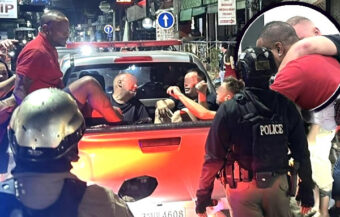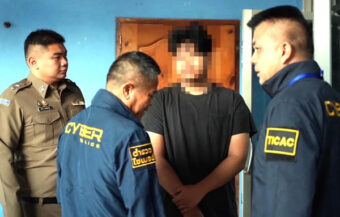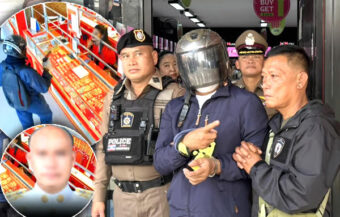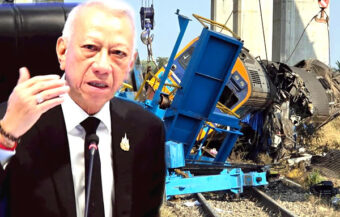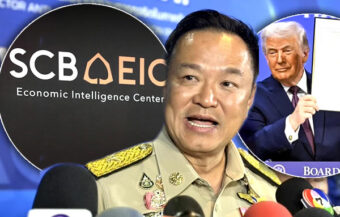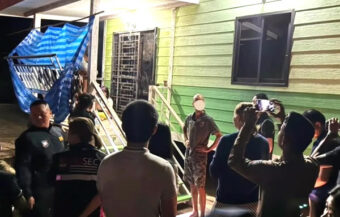Cambodia’s deadly three-day rocket attack on Sisaket targeted innocent Thai civilians using Chinese-made weapons. 17 killed nationwide. A last-minute US-brokered ceasefire stopped further bloodshed. Survivors’ powerful testimonies demand justice and urgent global action against Hun Sen’s regime.
Friday’s visit by foreign media and diplomats to Sisaket exposed a brutal truth: Cambodia’s three-day assault was a direct attack on innocent civilians. Despite a smaller military, Cambodia fired deadly Chinese-made rockets at unarmed Thai communities. This was no border skirmish—it was a campaign of terror. Thailand’s Foreign Ministry and officials are warning the world: these were clear war crimes. Only a last-minute, US-forced ceasefire stopped the bloodshed from escalating. Cambodia threatened to use its PHL-03 rocket launcher—a weapon that could have turned this into a full-scale war, slaughtering countless civilians and trampling international law. On Friday, brave Sisaket women told diplomats, including the Dutch military attaché, their horror stories—undeniable proof against propaganda.
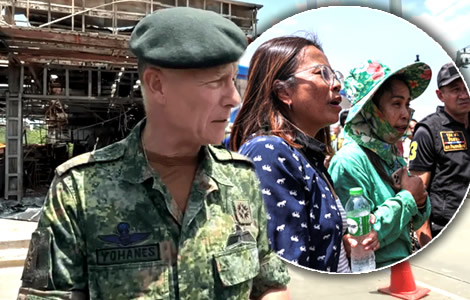
Thailand’s Ministry of Foreign Affairs, in coordination with the Royal Thai Army, brought a large international delegation to Sisaket Province on Friday. The group included ambassadors, military attachés and foreign media representatives from 23 countries. Their purpose was to witness firsthand the devastation caused by Cambodian artillery and rocket strikes.
The delegation visited Kantharalak District, the area most heavily hit during last week’s brief but deadly escalation. Thai officials reported that 17 civilians were killed in the attacks across six provinces, many of them in areas far from any military targets.
Foreign delegation visits Sisaket to witness devastation caused by Cambodian artillery and rocket strikes
According to the Royal Thai Army, Cambodia launched BM-21 Grad rockets directly into populated Thai areas. In one case, a gas station was struck in broad daylight. The explosion killed eight people, including four children. Another victim, a rubber plantation worker, died behind the building. The blast left the station in ruins, with personal belongings and debris scattered for metres.
Importantly, the gas station was located in a designated green zone. No military activity had been reported in or around the site. Therefore, Thai officials strongly believe the attack was deliberate. They argue it violated multiple international conventions and amounted to a war crime.
Governor Anupong Suksomnit met the delegation at the site. He held up photographs of the victims, describing their lives and the horror of their deaths. “These were not fighters,” he said. “They were families. Children. Ordinary citizens.”
Cambodian rockets hit a civilian gas station in designated green zone killing eight, including four children
Beside him stood relatives of the deceased. One mother clutched her child’s school shirt, still stained with blood. The group remained silent as the governor spoke, meanwhile letting the evidence speak for itself.
The most striking moment of the visit came when 13-year-old Pitchapat Phonsettalert addressed the crowd. She spoke in fluent English, despite her grief. Moreover, her father owned the gas station. In fact, she had lost family in the attack.
She looked directly at the delegation. “Cambodia used BM-21 rockets on civilians,” she said. “This is a peaceful area. We were not warned. Children died in their mother’s arms. We want justice.”
Her voice was steady, though her hands trembled slightly. Diplomats stood in silence, and some wiped their eyes.
Soon after, two village women approached Dutch military attaché Colonel Johannes and began speaking to him in fluent Dutch. They explained how their homes had been destroyed, furthermore detailing the sequence of the attack and the moments of chaos that followed. The colonel listened intently.
Brave village women tell diplomats in English and Dutch about Cambodian rocket attacks on civilians
Later, he expressed sorrow and alarm. “This was not a military exchange,” he said. “These were civilians. This should not happen.”
He added that Malaysia, as the ASEAN chair, must urgently consider how to prevent further violence. His statement was later shared widely, especially after a video of the exchange between the Thai women and the Dutch officer went viral on Thai social media.
Online, many praised the women for helping the international community understand the human cost of the conflict. The video also drew attention to the growing unease across Southeast Asia.
The Royal Thai Army insists its own military operations were purely defensive. Thai strikes, they said, were limited and precise. They only targeted Cambodian artillery positions and rocket launch systems.
Most notably, Thai officials pointed to Cambodia’s use of the PHL-03 multiple rocket launch system, a long-range platform developed in China. It has a range of 130 kilometres—enough to strike urban centres far from the border.
Dutch military attaché calls attacks on civilians unacceptable and urges ASEAN chair Malaysia to act
Just 24 hours before a U.S.-brokered ceasefire took effect on July 28, Thailand claims it was targeted by one of these powerful rockets. In response, military analysts warned that, had it landed in a populated area, the damage would have been catastrophic.
Cambodia’s use of such a system, Thai officials argued, brought the region dangerously close to full-scale war. Furthermore, they accused Phnom Penh of escalating the situation with weapons designed for large-scale destruction.
Although the fighting lasted only three days, it left lasting scars. Craters remain visible in farmland and residential neighbourhoods. Shattered homes and scorched vehicles line several roads in Sisaket. As a result, families are now living in temporary shelters or with relatives.
More than property was lost. Thai civilians suffered deep psychological trauma. Many spoke of the shock of being attacked in what they believed were peaceful zones. Some lost multiple family members in a single strike.
Powerful Chinese-made rockets nearly trigger full-scale war as civilians suffer lasting trauma and destruction
Despite the ceasefire, tensions remain high. Thai forces are on alert. Checkpoints along the border have been reinforced, and evacuation drills have been introduced in nearby districts. Royal Thai Air Force patrols continue to monitor the skies, though officials confirmed no Thai aircraft were damaged during the hostilities.
Thailand also faces a secondary battle: the war of perception. Cambodian media have circulated images of damage to villages on their side, allegedly caused by Thai artillery. But Thai officials maintain their responses were tightly controlled and aimed only at military targets.
In contrast, they say, Cambodia’s actions were indiscriminate and reckless. The choice of targets—schools, gas stations, and homes—appears to support Thailand’s claim of deliberate civilian targeting.
This concern was echoed by several diplomats during Friday’s visit. Many appeared visibly disturbed by the scale of the destruction. Privately, some expressed disbelief that such an incident could occur in what was thought to be a stabilised area of Southeast Asia.
International community notes China’s role in arming Cambodia with destructive long-range rocket systems
The tour ended quietly. Some diplomats placed flowers near the gas station ruins. Others spoke with families in temporary shelters, offering words of condolence.
Thailand urged to newly embrace international bodies in dealing with the Thai Cambodian border dispute
Acting PM travels to Kuala Lumpur for ceasefire talks. Cambodia’s PM Hun Manet to attend amid PR war
Trump’s lightning strike to knock Thai and Cambodian heads together for peace. Overnight ceasefire agreed
Thai military warns Cambodia about the deployment of Chinese made long range missiles against civilians
For now, the guns are silent. But as one official quietly said while leaving Sisaket, “This is not over.”
Thailand’s government continues to monitor the situation, urging all sides to exercise restraint. However, they insist the events of last week must not be forgotten. Civilians paid the price—twice: first in blood, then in silence. Now, Thailand says, the world must speak.
Join the Thai News forum, follow Thai Examiner on Facebook here
Receive all our stories as they come out on Telegram here
Follow Thai Examiner here
Further reading:
Cabinet meets after Cambodian ceasefire. Acting PM Phumtham spoke later with Trump for 30 minutes
Acting PM travels to Kuala Lumpur for ceasefire talks. Cambodia’s PM Hun Manet to attend amid PR war
Hot War rages on the Thai-Cambodian border following Cambodian troops offensive in Chong Bok area

